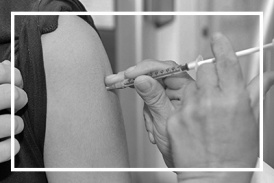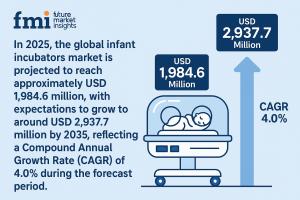Infant Incubators Market Set to Surpass USD 2,937.7 Million by 2035 Demand for Advanced Neonatal Care Technologies | FMI
Global infant incubators market surges as demand rises for advanced neonatal care technologies across hospitals and NICUs worldwide
Infant incubators, a cornerstone in neonatal care units, are essential in maintaining controlled temperature, humidity, and oxygen levels for preterm and low birth weight infants. These devices also play a critical role in infection prevention and early recovery in neonatal intensive care units (NICUs), hospitals, and pediatric clinics.
Uncover Market Opportunities: Access a Sample Report Now! https://www.futuremarketinsights.com/reports/sample/rep-gb-15506
The market is witnessing a surge in demand due to a combination of medical, technological, and socioeconomic factors. The increasing number of premature births globally is fueling the need for advanced incubator systems that can provide round-the-clock care and monitoring. The introduction of smart incubators equipped with artificial intelligence (AI), real-time data monitoring, and non-invasive sensors is transforming neonatal care, offering enhanced outcomes for infants and peace of mind for medical professionals and parents alike.
Moreover, improved access to neonatal equipment in underdeveloped and developing regions, along with government initiatives aimed at reducing neonatal mortality, is paving the way for the market's expansion.
Key Takeaways: Regional Market Highlights
United States
The U.S. continues to lead the global market for infant incubators, backed by a robust healthcare infrastructure, high preterm birth rates, and an ongoing wave of technological innovation in neonatal care. With a projected CAGR of 4.3%, the U.S. market is characterized by strong investments in advanced incubators with built-in temperature, humidity control, and real-time monitoring systems. Additionally, the adoption of mobile and transport incubators is on the rise, ensuring critical care during emergency transfers. Major medical device companies and government-backed neonatal programs further bolster the U.S. market’s leadership position.
United Kingdom
The UK market is gaining momentum owing to increased attention on neonatal care services and a steady rise in premature births. With a 3.8% CAGR, growth is largely attributed to NHS initiatives focused on improving infant survival rates through high-tech neonatal units. AI-based incubators and home-care neonatal solutions are also gaining popularity, indicating a shift toward decentralized care models.
European Union
The infant incubators market across the EU is expanding moderately, with a CAGR of 3.7%. Rising healthcare expenditures and a focus on NICU modernization in countries like Germany, France, and Italy are key growth drivers. Adoption of high-performance incubators with oxygen therapy integration and temperature regulation is prevalent. Stringent EU medical device regulations continue to encourage manufacturers to invest in safety, innovation, and quality in neonatal care devices.
Japan
Japan's infant incubators market is marked by strong technological integration and high medical standards. With a CAGR of 4.0%, Japan benefits from widespread use of AI and wireless-enabled monitoring systems in neonatal care. Coupled with a national focus on maternal and child healthcare and a reputation for precision medical instruments, Japan remains a major player in shaping next-gen incubator technologies.
South Korea
The South Korean market is experiencing steady and promising growth, expected to expand at a CAGR of 3.9%. Government-backed health programs aimed at reducing infant mortality, increasing NICU investments, and adoption of portable and mobile incubators for emergency care are all contributing to market momentum. South Korea’s technologically inclined healthcare sector is actively adopting next-gen incubators with automation and remote access features.
Interest in Market Trends: Get Detailed Analysis and Insights with Our Comprehensive Report! https://www.futuremarketinsights.com/reports/infant-incubators-market
Competitive Outlook
The global infant incubators market is home to a number of prominent manufacturers who are investing in cutting-edge innovation to cater to the evolving needs of NICUs and pediatric hospitals. These companies are focusing on AI integration, wireless technologies, compact transport solutions, and sustainable designs to ensure high-performance neonatal care.
Key players leading the market include:
• GE Healthcare
• Natus Medical Incorporated
• Inspiration Healthcare Group plc
• Koninklijke Philips N.V.
• Drägerwerk AG & Co. KGaA
• Fisher & Paykel Healthcare
• International Biomedical Ltd.
• Atom Medical Corporation
• Fanem Ltda
• Novos Medical Systems
These industry leaders are leveraging partnerships, research funding, and technological breakthroughs to maintain a competitive edge. Market consolidation through acquisitions and international collaborations is also on the rise, aimed at enhancing global reach and expanding neonatal care offerings.
Market Segmentation
By Product Type
• Intensive Care Incubators: Designed for continuous monitoring and long-term use in NICUs.
• Transport Incubators: Portable units developed for safe transportation of neonates between healthcare facilities or within hospitals.
By End User
• Hospitals: The primary setting for intensive neonatal care, including emergency deliveries.
• Pediatric and Neonatal Intensive Care Units (NICUs): Specialized units equipped with high-performance incubators for critical care.
• Others: Home care settings, maternity centers, and mobile clinics.
By Region
• North America
• Latin America
• East Asia
• South Asia & Pacific
• Eastern Europe
• Western Europe
• Middle East & Africa
Get Your Free Healthcare Market Growth Projections Today! https://www.futuremarketinsights.com/industry-analysis/therapeutic-device
Future Outlook
Looking ahead, the global infant incubators market is poised for sustained growth fueled by the convergence of medical innovation, rising demand for neonatal healthcare services, and broader accessibility to life-saving equipment. Smart, AI-enabled, and transport-friendly incubators will define the next phase of market evolution, especially in emerging economies where neonatal mortality remains a key public health challenge.
As the demand for highly responsive, automated neonatal care solutions increases, stakeholders—including manufacturers, healthcare providers, and policymakers—will play a pivotal role in ensuring these critical devices reach the infants who need those most.
Explore FMI’s Related Ongoing Coverage on Healthcare Market Insights Domain:
Infant Care Equipment Market Growth - Trends & Forecast 2025 to 2035: https://www.futuremarketinsights.com/reports/infant-care-and-baby-care-equipment-market
Insulin Pens Market – Growth & Forecast 2025 to 2035: https://www.futuremarketinsights.com/reports/insulin-pens-market
Gamma Probe Devices Market Growth - Trends & Forecast 2025 to 2035: https://www.futuremarketinsights.com/reports/gamma-probe-device-market
About Future Market Insights (FMI)
Future Market Insights, Inc. (ESOMAR certified, recipient of the Stevie Award, and a member of the Greater New York Chamber of Commerce) offers profound insights into the driving factors that are boosting demand in the market. FMI stands as the leading global provider of market intelligence, advisory services, consulting, and events for the Packaging, Food and Beverage, Consumer Technology, Healthcare, Industrial, and Chemicals markets. With a vast team of over 400 analysts worldwide, FMI provides global, regional, and local expertise on diverse domains and industry trends across more than 110 countries.
Contact Us:
Future Market Insights Inc.
Christiana Corporate, 200 Continental Drive,
Suite 401, Newark, Delaware - 19713, USA
T: +1-347-918-3531
For Sales Enquiries: sales@futuremarketinsights.com
Website: https://www.futuremarketinsights.com
LinkedIn| Twitter| Blogs | YouTube
Ankush Nikam
Future Market Insights, Inc.
+91 90966 84197
email us here
Visit us on social media:
LinkedIn
Facebook
YouTube
X
Legal Disclaimer:
EIN Presswire provides this news content "as is" without warranty of any kind. We do not accept any responsibility or liability for the accuracy, content, images, videos, licenses, completeness, legality, or reliability of the information contained in this article. If you have any complaints or copyright issues related to this article, kindly contact the author above.
Autonomous Last Mile Delivery Market Set to Skyrocket to US $144.2 Billion by 2033, Fuelled by 23.1% CAGR
Storage Management Software Market to Reach $25,853.66 Million by 2034 Globally, at 9.9% CAGR: Allied Market Research
NEFT Vodka Brings Mini Eco-Friendly Barrels to The Bottle Club
Kalendarium
Więcej ważnych informacji
 Jedynka Newserii
Jedynka Newserii

 Jedynka Newserii
Jedynka Newserii

Farmacja

Zagrożenie krztuścem pozostaje najwyższe od ponad trzech dekad. Odporność utrzymuje się do 10 lat po szczepieniu
W ubiegłym roku na krztusiec zachorowało ponad 32 tys. osób. To ok. 35 razy więcej niż rok wcześniej. Ostatnie tygodnie przynoszą wyhamowanie tendencji wzrostowej, ale Główny Inspektor Sanitarny przestrzega przed tą groźną chorobą i wskazuje na konieczność szczepień u dzieci już w okresie niemowlęcym i szczepień przypominających u dorosłych. Dużą rolę w promowaniu tej jedynej formy profilaktyki odgrywają pielęgniarki, które nie tylko informują o korzyściach ze szczepień, ale też mogą do nich kwalifikować.
Bankowość
Zdaniem 80 proc. Polaków ceny nieruchomości są wysokie lub bardzo wysokie. Mimo to i tak wolimy posiadać na własność, niż wynajmować

Tylko 26 proc. Polaków uważa, że mamy obecnie dobry moment na zakup nieruchomości. Dla ośmiu na 10 ankietowanych ceny nieruchomości są obecnie wysokie lub bardzo wysokie. 65 proc. ocenia też, że niewiele osób z ich otoczenia może sobie teraz pozwolić na zakup mieszkania lub domu – wynika z badania „To my. Polacy o nieruchomościach” portalu ogłoszeniowego Nieruchomosci-online.pl.
Transport
Nowe opłaty za emisję CO2 mogą spowodować wzrost kosztów wielu małych i średnich firm. Eksperci apelują o mądre instrumenty wsparcia [DEPESZA]

System ETS2, który zacznie obowiązywać od 2027 roku, nałoży podatek na paliwa kopalne wykorzystywane do ogrzewania budynków czy w transporcie. Koszty w dużej mierze poniosą dostawcy, w tym małe i średnie firmy. – Potencjalny wpływ systemu ETS2 na sektor MŚP w Polsce będzie znacznie mniej drastyczny, niż mogłoby się wydawać. Konieczne jest jednak przygotowanie odpowiednich instrumentów, które wesprą przedsiębiorców w przemianie w kierunku niskoemisyjnym, ale jednocześnie będą unikały podwójnej kompensacji – wskazuje raport WiseEuropa pt. „Wędka czy ryba? Wsparcie dla polskich MŚP w związku z wprowadzeniem ETS2”.
Partner serwisu
Szkolenia

Akademia Newserii
Akademia Newserii to projekt, w ramach którego najlepsi polscy dziennikarze biznesowi, giełdowi oraz lifestylowi, a także szkoleniowcy z wieloletnim doświadczeniem dzielą się swoją wiedzą nt. pracy z mediami.



![Nowe opłaty za emisję CO2 mogą spowodować wzrost kosztów wielu małych i średnich firm. Eksperci apelują o mądre instrumenty wsparcia [DEPESZA]](https://www.newseria.pl/files/1097841585/664-ciezarowki-postoj-foto2,w_85,_small.jpg)





.gif)

 |
| |
| |
|